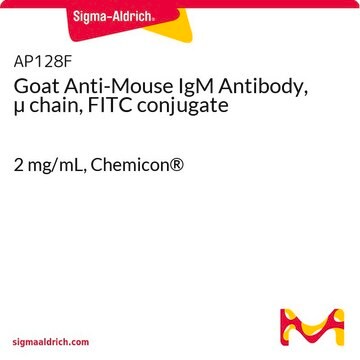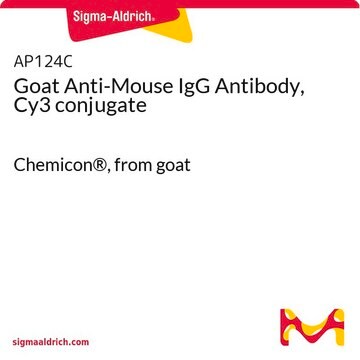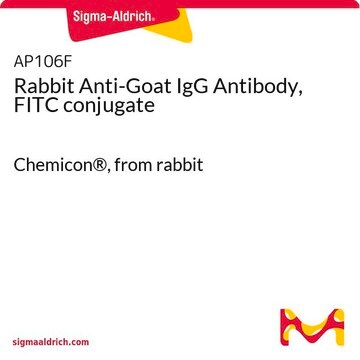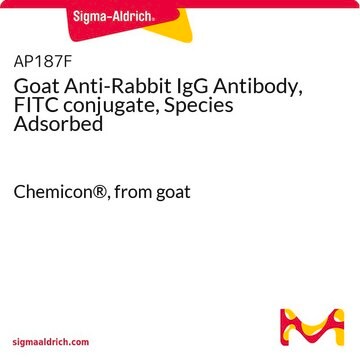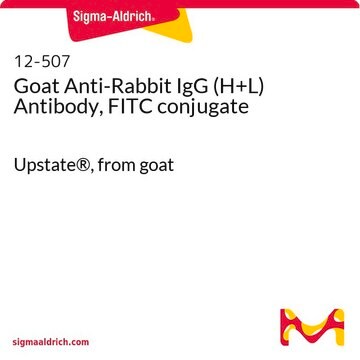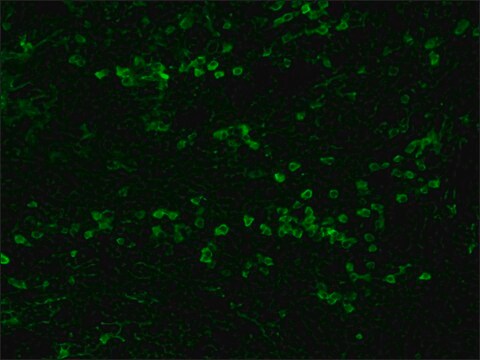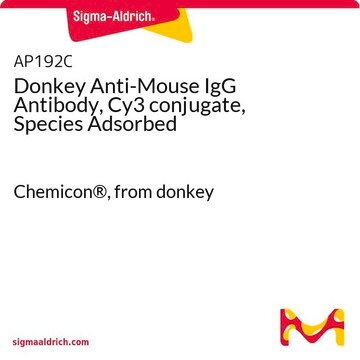AQ132F
Goat Anti-Rabbit IgG Antibody, F(ab′)2, FITC conjugate
Chemicon®, from goat
Sign Into View Organizational & Contract Pricing
All Photos(1)
About This Item
UNSPSC Code:
12352203
eCl@ss:
32160702
NACRES:
NA.46
Recommended Products
biological source
goat
Quality Level
conjugate
FITC conjugate
antibody form
F(ab′)2 fragment of affinity isolated antibody
antibody product type
secondary antibodies
clone
polyclonal
species reactivity
rabbit
manufacturer/tradename
Chemicon®
technique(s)
immunofluorescence: suitable
shipped in
wet ice
target post-translational modification
unmodified
Application
Goat anti-Rabbit IgG Antibody, F(ab′)2, FITC conjugate detects level of Rabbit IgG & has been published & validated for use in IF.
Research Category
Secondary & Control Antibodies
Secondary & Control Antibodies
Research Sub Category
Fragment Specific Secondary Antibodies
Fragment Specific Secondary Antibodies
Legal Information
CHEMICON is a registered trademark of Merck KGaA, Darmstadt, Germany
Disclaimer
Unless otherwise stated in our catalog or other company documentation accompanying the product(s), our products are intended for research use only and are not to be used for any other purpose, which includes but is not limited to, unauthorized commercial uses, in vitro diagnostic uses, ex vivo or in vivo therapeutic uses or any type of consumption or application to humans or animals.
Not finding the right product?
Try our Product Selector Tool.
hcodes
pcodes
Hazard Classifications
Aquatic Chronic 3
Storage Class
11 - Combustible Solids
wgk_germany
WGK 3
Certificates of Analysis (COA)
Search for Certificates of Analysis (COA) by entering the products Lot/Batch Number. Lot and Batch Numbers can be found on a product’s label following the words ‘Lot’ or ‘Batch’.
Already Own This Product?
Find documentation for the products that you have recently purchased in the Document Library.
Jonathan D Black et al.
British journal of cancer, 113(7), 1020-1026 (2015-09-02)
We evaluated the role of PIK3CA-mutations as mechanism of resistance to trastuzumab in primary HER2/neu-amplified uterine-serous-carcinoma (USC) cell lines. Fifteen whole-exome-sequenced USC cell lines were tested for HER2/neu-amplification and PIK3CA-mutations. Four HER2/neu-amplified USC (2-harbouring wild-type-PIK3CA-genes and 2-harbouring oncogenic-PIK3CA-mutations) were evaluated
RebL1 is required for macronuclear structure stability and gametogenesis in Tetrahymena thermophila.
Huijuan Hao et al.
Marine life science & technology, 6(2), 183-197 (2024-06-03)
Histone modification and nucleosome assembly play important roles in chromatin-related processes. Histone chaperones form different complexes and coordinate histone transportation and assembly. Various histone chaperone complexes have been identified in different organisms. The ciliate protozoa (ciliates) have various chromatin structures
Jing Xu et al.
PloS one, 7(12), e52799-e52799 (2012-12-20)
Conjugation in Tetrahymena thermophila involves a developmental program consisting of three prezygotic nuclear divisions, pronuclear exchange and fusion, and postzygotic and exconjugant stages. The conjugation junction structure appears during the initiation of conjugation development, and disappears during the exconjugant stage.
Mark A Miles et al.
Cell death & disease, 11(8), 680-680 (2020-08-23)
Most anticancer drugs provoke apoptotic signaling by damaging DNA or other means. Genotoxic therapies may enhance a patient's risk of developing "therapy-related cancers" due to the accumulation of oncogenic mutations that may occur in noncancerous cells. Mutations can also form
Huijuan Hao et al.
Cells, 12(24) (2023-12-22)
Histones and DNA associate to form the nucleosomes of eukaryotic chromatin. Chromatin assembly factor 1 (CAF-1) complex and histone regulatory protein A (HIRA) complex mediate replication-couple (RC) and replication-independent (RI) nucleosome assembly, respectively. CHAF1B and HIRA share a similar domain
Our team of scientists has experience in all areas of research including Life Science, Material Science, Chemical Synthesis, Chromatography, Analytical and many others.
Contact Technical Service
